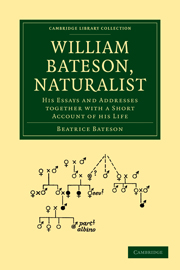Book contents
- Frontmatter
- Contents
- MEMOIR
- Hybridisation and Cross-breeding as a Method of Scientific Investigation
- Problems of Heredity as a subject for Horticultural Investigation
- An Address on Mendelian Heredity and its application to Man. Delivered before the Neurological Society, London, I. ii. 1906
- Gamete and Zygote. A Lay Discourse. The Henry Sidgwick Memorial Lecture, 1917
- Heredity and Variation in Modern Lights
- Presidential Address to the Zoological Section, British Association: Cambridge Meeting, 1904
- Presidential Address to the Agricultural Subsection, British Association: Portsmouth Meeting, 1911
- Presidential Address to the British Association, Australia: (a) Melbourne Meeting, 1914. (b) Sydney Meeting, 1914
- The Methods and Scope of Genetics. Inaugural Lecture delivered 23 October 1908. Cambridge
- Biological Fact and the Structure of Society. The Herbert Spencer Lecture, 28 February 1912. Oxford
- Science and Nationality. Presidential Address delivered at the Inaugural Meeting of the Yorkshire Science Association
- Common-sense in Racial Problems. The Galton Lecture
- Evolutionary Faith and Modern Doubts. Address to American Association for the Advancement of Science. Toronto, 1922
- Progress in Biology. An Address delivered March 12, 1924, on the occasion of the Centenary of Birkbeck College, London
- EDUCATIONAL ESSAYS
- Address to the Salt Schools, Saltaire, Shipley. 7 December 1915
- Evolution and Education
- The Place of Science in Education
- Classical and Modern Education
- Classical Education and Science Men. (Précis of evidence offered to the Prime Minister's Committee on Classics. June 1920)
- REVIEWS
- APPENDIX
- INDEX OF PERSONS
- INDEX OF SUBJECTS
- PLATES I-III (Figs. 1-6) to Mendelian Heredity and its application to Man
Classical and Modern Education
Published online by Cambridge University Press: 07 September 2010
- Frontmatter
- Contents
- MEMOIR
- Hybridisation and Cross-breeding as a Method of Scientific Investigation
- Problems of Heredity as a subject for Horticultural Investigation
- An Address on Mendelian Heredity and its application to Man. Delivered before the Neurological Society, London, I. ii. 1906
- Gamete and Zygote. A Lay Discourse. The Henry Sidgwick Memorial Lecture, 1917
- Heredity and Variation in Modern Lights
- Presidential Address to the Zoological Section, British Association: Cambridge Meeting, 1904
- Presidential Address to the Agricultural Subsection, British Association: Portsmouth Meeting, 1911
- Presidential Address to the British Association, Australia: (a) Melbourne Meeting, 1914. (b) Sydney Meeting, 1914
- The Methods and Scope of Genetics. Inaugural Lecture delivered 23 October 1908. Cambridge
- Biological Fact and the Structure of Society. The Herbert Spencer Lecture, 28 February 1912. Oxford
- Science and Nationality. Presidential Address delivered at the Inaugural Meeting of the Yorkshire Science Association
- Common-sense in Racial Problems. The Galton Lecture
- Evolutionary Faith and Modern Doubts. Address to American Association for the Advancement of Science. Toronto, 1922
- Progress in Biology. An Address delivered March 12, 1924, on the occasion of the Centenary of Birkbeck College, London
- EDUCATIONAL ESSAYS
- Address to the Salt Schools, Saltaire, Shipley. 7 December 1915
- Evolution and Education
- The Place of Science in Education
- Classical and Modern Education
- Classical Education and Science Men. (Précis of evidence offered to the Prime Minister's Committee on Classics. June 1920)
- REVIEWS
- APPENDIX
- INDEX OF PERSONS
- INDEX OF SUBJECTS
- PLATES I-III (Figs. 1-6) to Mendelian Heredity and its application to Man
Summary
Following that general misgiving as to our national system of education which, long felt by thoughtful men, found loud and continual expression during the war, Mr Asquith, then Prime Minister, appointed (1916) Committees to consider the position of natural science and of modern languages respectively. After these Committees had reported, a third Committee was set up (1919) to investigate the position of classics in our educational system. The Report of this Committee, recently issued, is a comprehensive document, full of interesting materials, readable and scholarly, as from the character of the Committee might be expected. The history of classical teaching in the several parts of the United Kingdom, its rise and recent decline, are set out in detail, with an abundance of information never before collected. As to the main inference, no mistake is possible. The classical element in British education is disappearing, and will probably soon be gone altogether.
In the Public Schools few boys are learning Greek, and even Latin, though still generally taught in middle and lower forms, tends more and more to be dropped higher up. None of the new Provided Schools has yet been able to develop a classical tradition and few of them teach Greek…. The danger with which we are faced is not that too many pupils will learn Latin and Greek, but that the greater part of the educated men and women of the nation will necessarily grow up in ignorance of the foundations on which European society is built.
- Type
- Chapter
- Information
- William Bateson, NaturalistHis Essays and Addresses Together with a Short Account of His Life, pp. 441 - 445Publisher: Cambridge University PressPrint publication year: 2009First published in: 1928



